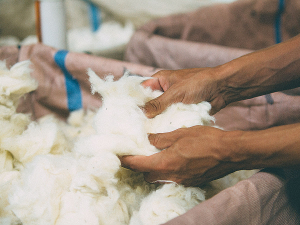Top wool advocate bales out
The conversion of productive farmland into trees has pretty much annihilated the wool industry.
 Godfrey Hirst is demanding Cavalier withdraw a number of claims promoting New Zealand wool as a more sustainable alternative to synthetic carpet.
Godfrey Hirst is demanding Cavalier withdraw a number of claims promoting New Zealand wool as a more sustainable alternative to synthetic carpet.
Carpet maker Cavalier is facing the wrath of American-owned rival Godfrey Hirst over the Kiwi company's push to promote more woollen products.
Godfrey Hirst has demanded Cavalier withdraw a number of claims in its marketing campaign, which promotes New Zealand wool as a more sustainable alternative to synthetic carpet fibres, or face legal action under the Fair Trading Act.
It claims that Cavalier and Bremworth had "demonised" synthetic carpets, with what it alleges were false and misleading references to single-use plastic bags and microplastics, and by lauding environmental wool carpets without acknowledging the full environmental impacts of wool carpet manufacturing, including livestock farming and wool scouring chemicals required for insect-resistant treatment of wool.
However, Cavalier is refusing to cower to its American rival. In a statement, released to the NZX, it says it will not shy away from promoting the virtues of wool.
It's not the first legal challenge from Godfrey Hirst, a former Australian company bought by New York Stock Exchange-listed global flooring manufacturer, Mohawk, in 2017.
Late last yearm under former chief executive Paul Alston, Cavalier announced that it was getting out of synthetic carpets altogether.
This was seen as a bold move, but new chief executive Greg Smith says the consumer feedback had so far been positive.
"From my perspective, I am very confident in the natural fibre strategy and the way that we are trying to reach our consumers," he recently told the NZ Herald.
He says wool carpets were Bremwoth's history: "100 per cent wool is where we started."
Smith acknowledges that there is a consumer preference for synthetic carpet.
"Clearly consumers have embraced synthetics, as they have done in lots of different industries," he concedes.
He added that the decision to stop making synthetic carpets was a difficult one. "There are always revenue implications when you give up a slice of your business to go down a different path."
Smith points to the ban on plastic bags and the electric car subsidy as proof of the consumer landscape changing quickly.
"These things are all happening because consumers and want a more sustainable future," he says.
Smith believes that natural solutions are becoming more "normal".
Mating wrapped up last month at the across-breed Beef Progeny Test on Pāmu’s Kepler Farm in Manapouri.
Libby Judson is a keeper of memories from an age gone by. Tim Fulton tells her story.
A New Zealand-first native tree study has highlighted the Bioeconomy Science Institute's position as a forestry research leader.
Hemp fibre processor Rubisco is relocating its core processing facility to Ashburton as part of a $20-$30 million expansion to leverage what it says is an accelerating global demand for sustainable and renewable fibres.
Tradition meets some of the latest in technology at the 2026 East Coast Farming Expo.
OPINION: Trade Minister Todd McClay and the trade negotiator in government have presented Kiwis with an amazing gift for 2026 - a long awaited and critical free trade deal with India.

OPINION: If the hand-wringing, cravat and bow-tie wearing commentariat of a left-leaning persuasion had any influence on global markets, we'd…
OPINION: With Winston Peters playing politics with the PM's Indian FTA, all eyes will be on Labour who have the…